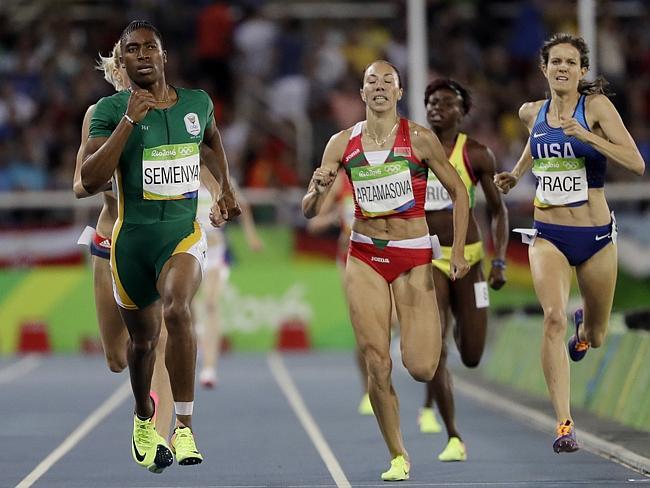Caster Semenya 800m Rio Olympics: Most sensitive race of Games as South African star runs
ANDROGYNOUS superstar Caster Semenya is racing against Olympic rivals who simply cannot match her, which critics call “ridiculous”. Now she’s in the Rio 800m final.

Olympics
Don't miss out on the headlines from Olympics. Followed categories will be added to My News.
SOUTH African runner Caster Semenya received a restrained welcome to the Rio track on Friday as she cruised into the final of the 800m ahead of what most judges believes will be a certain gold medal.
Semenya took her time to dominate the third semi -inal but turned on the power in the final bend to run away as an easy winner.
There was polite applause at the start and finish - certainly nothing on the reception other big name and dominant athletes have received from the Brazilian crowd.
There were unconfirmed reports over the past few days that Games organisers have “beefed up Semenya’s security”.
She will run the final on Sunday at 10.15am AEST.
Semenya, the so called intersex athlete, has divided the sport’s fans between those who feel her biological make-up is merely the luck of the draw and those who feel her pariticpation is unfair on her rivals.

“It’s a hard situation … This goes beyond sport to the human being,” John Steffensen, an Australian Olympian born in South Africa, told Fox Sports Australia.
Semenya, 25, has a condition known as hyperandrogenism. She has always identified as a woman, but she has many of the physiological features of a man, including, according to a leaked medical report from 2009, internal testes and testosterone levels exceptionally higher than her rivals.
Her sport’s governing body, the IAAF, implemented rules whereby Semenya, and other similar athletes, were required to take medication that decreased their levels of the hormone to levels considered “normal” for female athletes. That was overturned on an appeal to Court of Arbitration for Sport by a different athlete with the condition.
The medication brought Semenya back to the field, but having come off it Semenya is expected to street the field in Rio.
“WE HAVE TO BE SENSITIVE”
John Steffensen is bracing for a car wreck, where the world charges in blindly and does psychological damage to Semenya and others who share similar attributes.
“The girl’s not cheating,” he said. “She’s born this way, it’s not a choice. We have to be sensitive to that. You as a journalist, me as a track fan, we have to be sensitive.
“How you write about it and invoke fear in it is going to inflame the situation. Make it normal.
“If you want to talk about the fair element of it was it fair she was born that way? It becomes more a humane response for me: This is a girl who didn’t ask to be this way. She loves running and is running well.”
She certainly is. In April, Semenya became the first athlete to win the 400m, 800m and 1500m at the South African national titles, all within a four hour span.
Then, in July in Monaco, she ran a national record 1:53.33, within a stride of one of the most ridiculed marks in the women’s record books.
In 1983 Jarmila Kratochvilova, an average 800m runner from the Czech Republic, came out and ran 1:53.28. Reports queried her physique in similar tones to now with Semenya.
“Her broad-shouldered, flat-chested physique looked more like a middleweight boxer’s than that of a middle-distance runner,” wrote one. “You had no idea it was a woman,” said Joan Nesbit Mabe, a US Olympian in 1996.
“I’m a sports fan and I’m about equal playing fields and she’s not running times that none have run before,” Steffensen says.
“I can only speak for myself. There’s a lot damage that can be done to a human being over this issue. Drug cheats …pffft I don’t care how they feel. They made a choice and should take responsibility for it. This girl didn’t make a choice. She was born this way.”
“IT’S RIDICULOUS”
Nic Bideau, a former coach of Steffensen and 13 of Australia’s Rio track team, says the rules allowing her to run are wrong.
‘This so clear cut and so decisive, she can win the Olympic Games and not run really well,’ Bideau told the Herald Sun.
“It’s ridiculous but that’s the rules, what can you do about it? It’s not her fault, it’s just unfortunate.
“You should only be able to win a gold medal in the Olympics if you run great but she can run ordinary and win.
All the races I have seen this year, she just jogs the first lap and then sprints home in the end. She is never challenged.”
The issue has moved beyond sports as well. Best-selling American author Malcolm Gladwell, writing on the Games for the New Yorker, said he’s “astonished at how many people fail to appreciate the athletic significance of this”.
“Remember, this is a competitive issue, not a human-rights issue. No one is saying that Semenya isn’t a woman, a human being, and an individual deserving of our full respect.
“People need to understand that an athletic competition has to have rules; otherwise there can be no competition. Semenya is equipped with an extraordinary and anomalous genetic advantage. We have a situation where one woman, born with the biological equivalent of a turbocharger, is now being allowed to ‘compete’ against the ninety-nine per cent of women who have no such advantage.”
THE IOC POSITION
THE International Olympic Committee’s medical director said Tuesday that the IAAF was looking into the issue to find a clearer path following the overturn in the CAS.
“The IAAF are researching into this area to see if there are rules that will help women’s sport to remain fair, but hugely complicated and difficult subject, as you all know,” said Dr Richard Budgett.
“There is no gender testing at the Rio Games. There are no rules about hyperandrogenism at these Games and the CAS decision meant the IAAF rule was suspended and it would have been illogical for us to have any rules at the Games.
“The eligibility of an athlete to compete in women’s events depends on the international federation and if you’re eligible under international federation rules then you can compete in that event.”
WILL SHE WIN?
If Semenya goes full throttle, she will win by a long way. But is already talk that she might aim to minimise the distance between her and her rivals, to lessen potential fall out. In 2012 she took the silver medal and former athlete turned commentator Colin Jackson thought she tanked.
“When Semenya’s testosterone was lowered to “normal” levels, she ran in the two-minute range for the eight hundred metres, which put her comfortably among the best in the world,” said Gladwell. “Now that that restriction has been lifted, she is running six seconds faster. No one will beat her in Rio. She could run the last 50 yards backward and still win. How do you think the other women in that race feel about that?”


